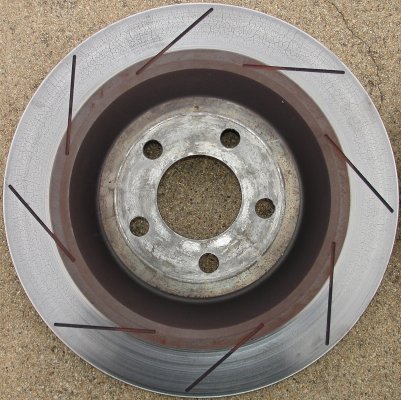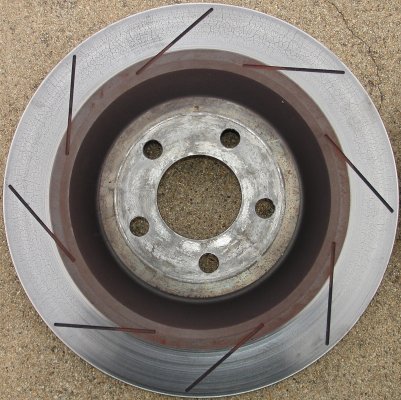If anyone is wondering 'what the hell is this guy doing here posting out of the blue again like he has a clue'... Blame BigJ who asked me to chime in as I've done a lot with *really* big vehicles run on road race tracks (around 4600 lbs) and working on big brake setups for same in that environment. Some quick thoughts:
- 3-ton curb weight notwithstanding, your brakes are by and large going to be fine. This truck was designed with 90 mph desert runs in mind. So speed and stopping was taken into account.
- Old saw I like to repeat: Your engine doesn't make the car go. Your brakes do not make it stop. The tires do all that. If you want to make a huge dent in your stopping ability, improve your traction, be it in sand or on pavement.
- Big brakes on sand will just lock the wheel or make ABS go insane. Heat buildup isn't going to be anywhere near the issue it would be if the tires were slicks on pavement
- There is nothing ... *nothing* ... that anyone driving anything can do that will approximate track stresses. Even the most severe street use is peanuts to a decent braking system.
Here's the smart brake upgrade:
1. Stainless lines: They just feel good and do nothing for performance. But they feel good. Cheap, satisfying way to get a firmer pedal if you like that.
2. Better fluid. You want a higher wet boiling point as opposed to a higher dry boiling point unless you like to change brake fluid frequently... I do it monthly between track events so I can used DOT4 stuff that runs $50 a bottle and has a dry boil of almost 700 degrees... I bet you don't want to go there. So get something thats meant to sit in the system and will still be good 6 months later. This assumes the factory fluid is crap (it might be good stuff so don't just bleed it out. Learn its specs). Probably the best alternate fluid will turn out to be ATE Super Blue. Dirt cheap, compatible with everything and a very high wet boil as those things go.
STOP.
Do nothing more until someone demonstrates an inadequacy in the stock brakes with better fluid and the nice foo foo stainless lines.
Watch the rotors. The one at the very bottom was brand new and saw one day on the track. This is what happens after heat cycling. I bet you will never see this, ever.
Another thing about that rotor: Notice the slots? Look in them... the discoloration is from the pads chuffing into them, which builds up brake dust and causes the pads to wear a little faster. It also vents what little excess gas is generated by 21st century pads. Outgassing was brought up earlier and slots - as well as modern pad compounds - solve the problem.
NEVER use 2-piece rotors on a bigass vehicle. Learn to love the big iron hats and the unsprung rotating mass. Why? You drive a tank and a tank needs iron to sink heat into. More iron than you have when you push it to the limit. 2-piece rotors mean less iron and less heat sink capacity. I learned this lesson very painfully (read: empty wallet). You should see how bad a 17-lb 2-piece rotor cracked compared to the 1-piece 26-pounder shown below.
Next: Watch the pads. If they go away really fast you are stressing them out and need to step the compound up. I will skip going into what makes a good pad for big weight and big stress except to note that if you want low dust, you get brakes that don't work so great at higher temps. If you want high performance, you get dust in buckets and squeal when you are puttering around town. Pick one or the other because you can't have both.
Last but not least, if you can't stop the truck, fix the problem: Get better pads. Chances are you do not have a problem with clamping force from the calipers, so get pads that are more badass. Good luck with that. Sourcing pads is a royal screaming bitch unless you get lucky and its a common pattern. One place to go if you have trouble is Porterfield Brake. They will custom make pads at very reasonable prices. All you have to do is provide a backing plate and they will make a pattern from it. Raybestos ST-41 compound will probably stop your happy ass right quick. Also I know CarboTech has a compound that they will make for you that is meant for Formula 1 and it will stop a 4600 lb car coming down repeatedly from 160 mph so hard that the vehicles rims softened from the heat and hardened in new shapes (seriously). At your curb weights you are going to find... well ... *nothing* meant for high performance thats rated for these vehicles. But you aren't trying to race so I bet race compounds will be fine for those of you who feel compelled to go for it.
Good luck and don't spend your ass until you really know you need to.
(right click and open image in a new window to see it full size)




